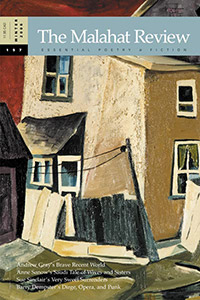Issues
Our Back Pages
Issue #157
Issue Date: December 2006
Editor: John Barton
Pages: 110
Number of contributors: 24
Buy Issue 157: Print Edition

This issue contains many exciting pieces, both prose and poetry, written by names readers will recognize, including Andrew Gray, Sue Goyette, Sue Sinclair, and Henry Beissel. Jeanette Lynes also contributes two noteworthy poems to this issue, each less than one page in length, titled “The Tart Box” and “Passes.”
Gray contributes the first piece, an eerie short story written in the second person (“you” are the protagonist) about a mentally unhinged mother, titled “Twentieth-Century House.” The story is doubly unsettling, both for its unusual point-of-view which invites the reader to enter into the mind of a mentally-ill character, and for its gruesome story, revealed through the protagonist’s interactions with other characters. Highly immersive and vivid, the story is an imaginative tour de force.
Following Gray’s piece are two short prose poems by Sue Goyette, both of which deal with themes of poetic inspiration and writer’s frustration. Goyette’s second poem, “My Darkness, My Cherry Tree,” invites “whoever has no house now, come in, come in” likely punning on the Italian meaning of the word stanza (“room”) metaphorically equating the separate stanzas of a poem to rooms of a house.
Not to miss in this issue is Henry Beissel’s enigmatic poem “January Up North.” Comprised of nine three-line sections, “January Up North” can be read as both a series of brief, haiku-like poems and as a single cohesive piece. Images of ice and snow form unexpected relationships with things such as bees and art nouveau, creating surprising and delightful metaphorical connections through juxtaposition.
As for book reviews, this issue contains a wonderfully didactic and verbose review by Eric Miller (current member of Malahat’s poetry board) of Phil Hall’s book of poetry An Oak Hunch. Miller provides a brief but detailed exegesis of Hall’s poems, focusing on what he calls “devices of compression” such as pun, aphorism, compound nouns, and so on. Readers of Hall’s poetry should find this short but dense review invaluable. Tanis MacDonald also provides a review of Méira’s Cook’s Writing Lovers: Reading Canadian Love Poetry by Women. Rather than instructing readers, as Miller’s review does, MacDonald’s review takes a more conversational and anecdotal tone. In addition to her thoughts on the book, MacDonald also provides a concise summary of Cook’s work.
—James Kendrick









